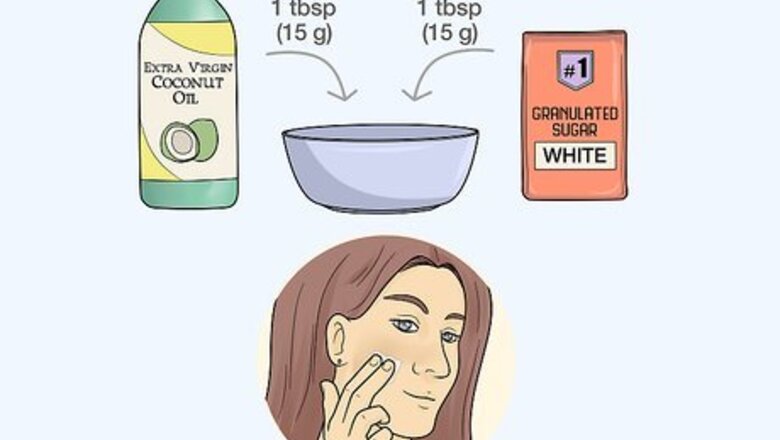
views
Removing Tanner from Your Face
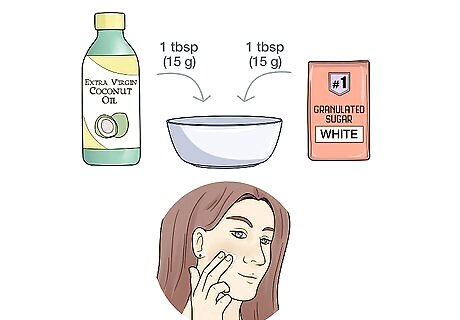
Exfoliate the tan away with a gentle sugar-based facial scrub. Mix 1 tablespoon (14.8 ml) (15 grams) of coconut oil with 1 tablespoon (14.8 ml) (15 grams) of white granulated sugar. Use your fingers to gently massage the mixture onto your face for 1 to 2 minutes. Avoid exfoliating the sensitive skin under your eyes. If you have sensitive skin, use brown sugar instead because it’s less abrasive. Be careful not to apply too much pressure because over-exfoliating can cause dryness or irritation. If you don’t have white sugar, use salt instead. Avoid using organic sugar because it’s more coarse than other types and might be too abrasive.
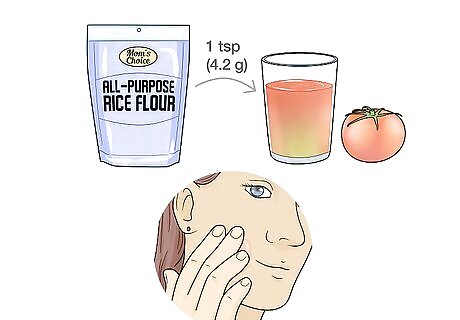
Mix the juice of 1 tomato with 1 tsp (4.2 g) of rice flour and scrub it on your face. Use a juicer to juice 1 medium-sized tomato or buy pre-made tomato juice and use ⁄4 cup (59 mL). Add the rice flour and stir it together until it forms a thin paste. Gently scrub it onto your face using small circular motions for 1 to 2 minutes before rinsing and washing your face clean with a mild cleanser. Tomato juice contains ascorbic acid, which can lighten your complexion while providing a healthy dose of vitamin C and antioxidants. You can also make tomato juice by mixing equal parts of tomato sauce and water. If you don’t have a juicer, slice of the top of the tomato, scoop out the flesh with a spoon, and mash it with a fork until it’s a smooth, watery consistency. Do this treatment up to two times a week—it will act as a mild exfoliant so doing it more often might dry out your skin.
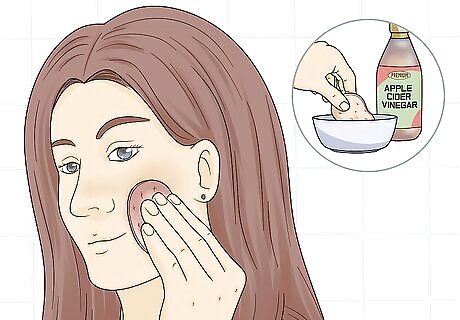
Wipe your face with a cotton pad soaked in diluted apple cider vinegar. Shake the bottle to distribute the “mother” (the clumpy bacteria that settles at the bottom), then pour 1 tablespoon (15 mL) into a small mixing bowl. Add 1 tablespoon (15 mL) of water and stir it together to dilute the vinegar. Soak a cotton pad in the mixture and then rub it onto your face, going over each section at least 3 to 4 times. Do this once or twice a day before rinsing and washing your face with a mild facial cleanser. As a bonus, apple cider vinegar has antibacterial properties that will clear up any blemishes. It’s important to dilute the vinegar because applying straight vinegar lowers the pH of your skin and may cause a burn-like reaction. If you have sensitive skin, use 3 parts water and 1 part apple cider vinegar instead.
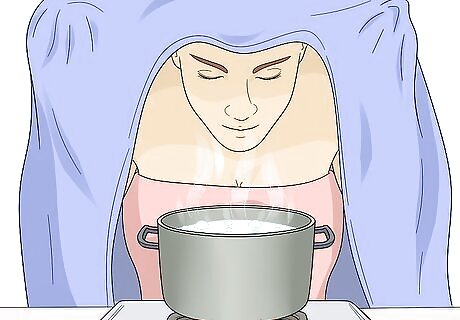
Steam your face over the stove for 20 minutes at least once a day. Heavy sweating can act as an exfoliant and cause tanning cream to fade much quicker. Fill a pot with water and bring it to a mild boil (not too mild but not rolling—just enough so that you can see a good amount of steam). Lean over the stove to expose your face to the steam and drape the towel over your head to keep the steam directed at your face. As an alternative, do an intense workout to work up some facial sweat. If you have access to a sauna or steam room, relax for 20 minutes or until you work up a sweat then wipe your face with a soft towel. As a plus, the steam will help clear your sinuses (especially if you add a few drops of eucalyptus oil to the water).
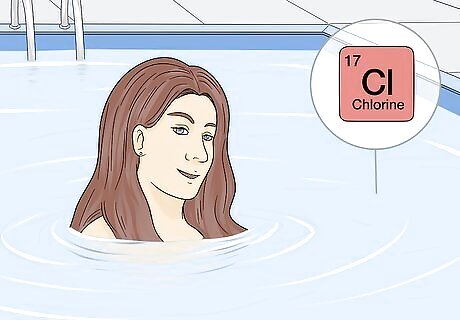
Go for a swim in a chlorinated pool. Chlorine will break down DHA, the main ingredient in most tanning lotions. Take a dip in the pool as much as you like, just note that it may not work as quickly as other methods. Go for a swim and then use other tan-removing techniques to fade your face tan quicker. If you have very dry skin, avoid exfoliating your face immediately after you swim. Ocean water is less effective than pool water at breaking down DHA because it doesn’t have chlorine. However, saltwater can act as a mild exfoliate that will help remove some of the tanning cream. If you used a self-tanner without DHA, this method won’t be as effective but it may still help fade the tan. Harold Lancer Harold Lancer, Dermatologist To gently fade a sun-induced tan, use brightening ingredients like vitamin C, niacinamide, and kojic acid for moderate exfoliation without irritation. I also advise professional chemical peels every 4-6 weeks to renew skin cells from below, gradually restoring brighter tone. Skin renews on its own timeline—be patient. Consistent use of both at-home brighteners and periodic professional treatments will safely reduce sun damage evidence, clarifying complexion clarity.
Fading a Natural Suntan
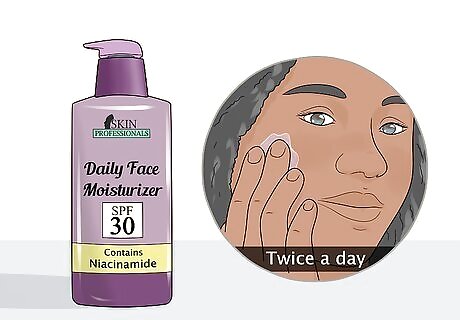
Use a moisturizer containing niacinamide twice a day. Lots of facial products contain this ingredient to correct uneven skin tone and get rid of fine lines and wrinkles, but it can also have a skin-lightening effect because it inhibits melanin in your skin. Apply it twice a day (morning and night) after cleansing your face and before using your regular moisturizer. Niacinamide can increase your skin's sensitivity to the sun so be sure to wear a facial moisturizer that has SPF (SPF 30 UVA/UVB is ideal) and stay out of the sun as much as you can. Niacinamide has been studied as a safe alternative to skin lightening products, which can cause mercury poisoning and lead to greater health problems.
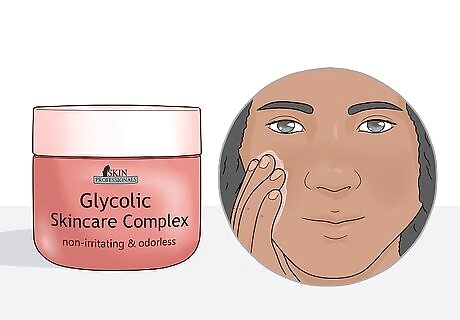
Use a cream containing glycolic acid to lighten your skin. Glycolic acid is found in lots of skincare creams, so look for this ingredient on the label or in the list of ingredients. Apply a dime-sized amount to your freshly cleaned face then follow up with a moisturizer. If you’re applying it in the morning, use a moisturizer that has SPF because glycolic acid can increase your skin’s sensitivity to the sun. If a product contains 10% glycolic acid, it’s good for everyday use. If it’s a 30% formula, only use it once or twice a week.
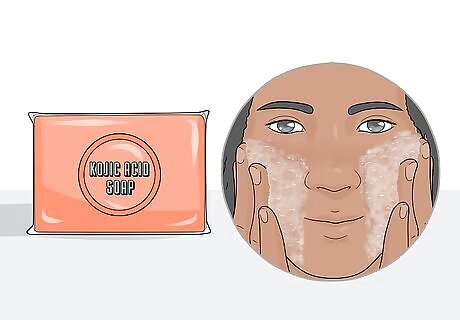
Wash your face with a soap containing kojic acid to safely lighten your skin. Kojic acid comes from mushrooms and is considered to be a safe alternative to skin-lightening creams. If you have sensitive skin, try using the soap only once or twice a week to avoid dryness and irritation. Once your skin is used to it, you can use it more often to fade your skin. Kojic acid is also great for treating hyperpigmentation, brown spots, and post-breakout spotting. You can purchase kojic acid soap in a bar or liquid form either online or from a skincare specialty store. Kojic acid can also be found in night creams, serums, and masks.
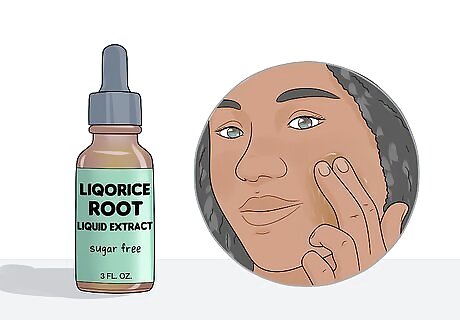
Block melanin production by applying licorice root extract every day. Licorice blocks the formation of melanin by inhibiting the enzyme that produces it. Apply ⁄2 teaspoon (2.5 mL) to your face and wait 30 minutes before washing it off. Do this treatment every day or every other day. As a plus, licorice root will also even out your skin tone and get rid of dark spots. Liquiritin and licochalcone are the compounds in licorice root that is responsible for its skin-lightening effects. Licorice root has skin-soothing properties, so it’s ideal for sensitive skin. You can also find licorice root powder that can be mixed with other powdered ingredients (like hibiscus, neem, and orange peel). Use 1/8 teaspoon (0.5 grams) of each powder and enough warm water to make a paste.
Using DIY Facial Masks for Lighter Skin
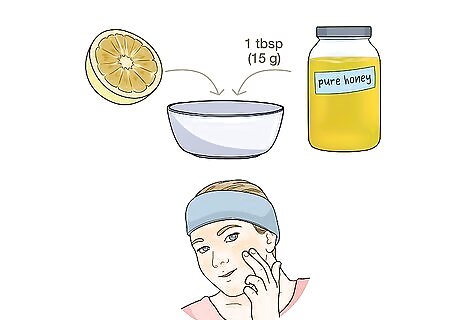
Apply a facial mask made from lemon juice and honey every day. Blend the juice of 1 medium-sized lemon with 1 tablespoon (14.8 ml) (15 grams) of honey and massage it onto your face. Let it sit for 5 to 10 minutes before washing it off. Do this treatment every day for up to 2 weeks to fade your tan. Honey helps moisturize your skin and, as a plus, it can get rid of acne-causing bacteria. Lemon can remove enzymes that produce melanin (which allows your skin to darken after sun exposure). If you have sensitive skin, this isn’t a good treatment option for you.
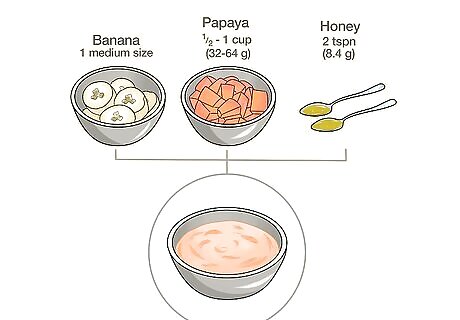
Use a honey, banana, and papaya face mask for sensitive skin. Use a fork to mash 1 medium-sized banana together with ½ to 1 cup (32 to 64 grams) of cubed papaya until there are no chunks larger than a pea. Add 2 teaspoons (8.4 grams) of honey and stir it well. Smear it onto your face and let it sit for 15 to 20 minutes before rinsing and washing it off with warm water. Pat your sensitive skin dry instead of rubbing it.
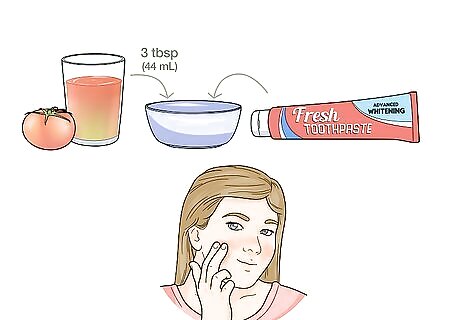
Apply toothpaste and tomato juice to brighten your face. Mix a dime-sized amount of toothpaste with 3 tablespoons (44 mL) of tomato juice and apply it to your face. Leave it on for 5 to 10 minutes before washing it off with water and a mild facial cleanser. Avoid using a toothpaste that contains SLS and propylene glycol if you have sensitive skin because these ingredients can cause irritation.
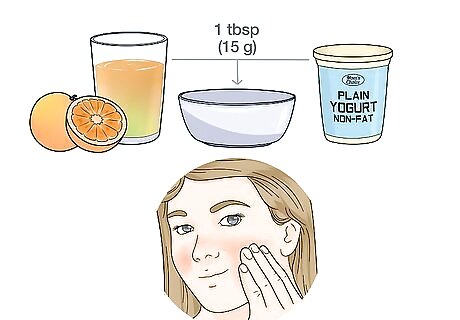
Do a 30-minute facial treatment with orange juice and yogurt. Blend 1 tablespoon (15 mL) of orange juice with 1 tablespoon (14.8 ml) (15 grams) of plain yogurt and apply it to your face using circular motions. Leave it on for 30 minutes and then wash it away with a mild facial cleanser. Do this treatment every other day or every day to fade a tan fast.



















Comments
0 comment